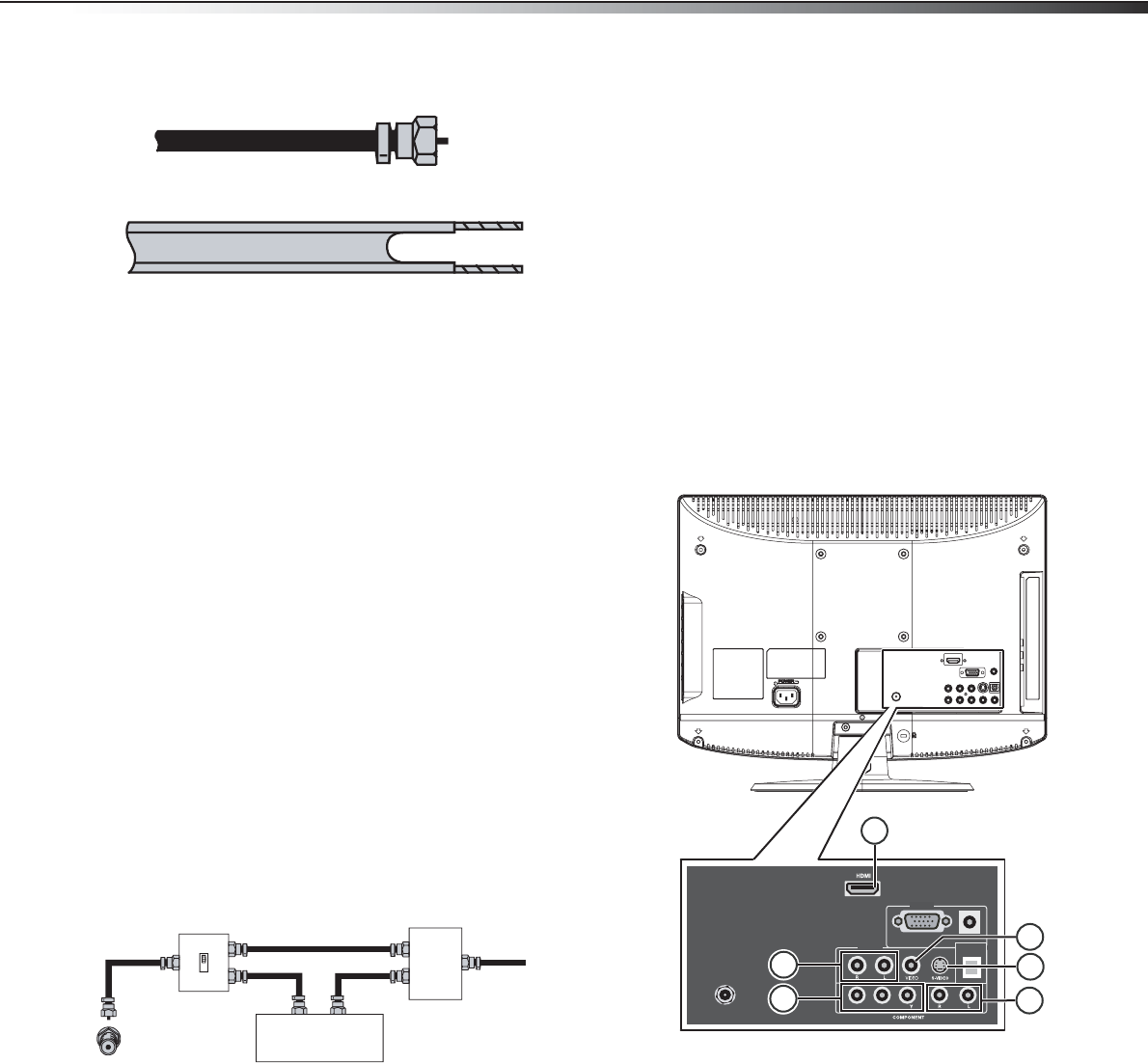
Setting up your TV
7
Connecting an outside antenna
Antenna cables come in two types: 75 ohm and 300 ohm.
• If your antenna cable has a 75 ohm connector, connect the cable
to the coaxial jack on the back of your TV.
• If your antenna cable has a 300 ohm connector, connect the cable
to a 300-75 ohm adapter (not included), connect the adapter to a
75 ohm cable, then connect the other end of the 75 ohm
connector to the coaxial jack on the back of your TV.
Connecting cable TV
Your TV has a 75 ohm jack for connecting cable TV.
Some cable TV providers scramble the signals for “premium” (pay)
channels. To view these channels, you need a converter/descrambler
box.
If you do not have a converter/descrambler box, you can connect your
cable TV directly to your TV. If you have a converter/descrambler box,
you can connect your cable TV using an RF switch (not supplied). For
more information about connecting a converter/descrambler box,
contact your cable TV provider.
To connect cable TV without a converter/descrambler box:
1 Connect one end of a 75 ohm cable to the coaxial jack on the back
of your TV.
2 Connect the other end of the cable to the cable TV wall outlet.
To connect cable TV with a converter/descrambler box:
• Use the following illustration to connect a converter/descrambler
box. (The RF switch and the signal splitter are not provided.)
Set the RF switch to the A position to tune to unscrambled
channels using your TV remote control. Set the RF switch to the B
position to watch scrambled channels using the
converter/descrambler controls.
Connecting to an external signal source
You can connect a DVD, VCD, VCR, or STB using a variety of methods,
including composite cables, component cables, an S-Video cable, or an
HDMI cable. The S-Video cable does not carry sound. If you use an
S-Video cable, you need to use audio cables to connect the audio
output.
Warning: Make sure that you turn off and unplug your TV before
connecting devices.
Note: For better video, use the S-Video jack if your device has an S-Video
connection. For best video, use the HDMI jack if your device has an
HDMI connection.
To connect an external signal source:
1For composite video—Plug the audio/video cable into the
AUDIO L, AUDIO R (2), and VIDEO (4) jacks on the back of your
TV, then connect the other ends to the corresponding jacks on the
external signal source.
Or
For S-Video—Plug in the audio cables as described above, then
plug one end of an S-Video cable into the S-VIDEO (5) jack on the
back of your TV, then plug the other end into the S-Video jack on
the external signal source.
Or
For component video—Plug the Y, Pb, and Pr video cables
into the COMPONENT (3) jacks and the Audio L and Audio R
cables into the AUDIO (6) jacks on the back of your TV, then plug
the other ends of the cables into the corresponding jacks on the
external signal source.
Or
For HDMI—Plug one end of an HDMI cable into the HDMI (1)
jack on the back of your TV, then plug the other end into an HDMI
device.
2 Turn on your TV.
3 Press INPUT repeatedly to select the external signal source you
want to watch.
4 Turn on external signal source.
5 Insert a disc or videotape into the external signal source, then
press PLAY.
75 ohm cable
300 ohm cable
RF switch
Cable converter/descrambler box
Two-set signal splitter
Out
In
A
B
TV
VGA AUDIO
SPDIF
AV IN
PC IN
Pr Pb
ANTENNA / CABLE
DIGITAL / ANALOG
TV
1
2
3
4
5
6


















